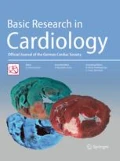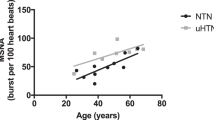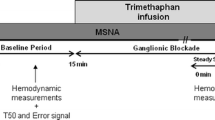Abstract.
Arterial muscle sympathetic baroreflexes are frequently assessed using pharmacologically evoked decrements in arterial blood pressure. Since drugs administered for baroreflex tests may themselves alter the sympathetic response to evoked pressure variations we proposed a method to determine sympathetic baroreflex gain during spontaneous fluctuations in arterial pressure at rest and tested the null hypothesis that baroreflex gain assessed during spontaneous fluctuations in arterial pressure equals baroreflex gain determined during evoked hypotension. Muscle sympathetic nerve activity (MSA), arterial blood pressure, and heart rate were assessed at rest in 15 healthy volunteers (age: 29 years ± 5, mean ± SD). All diastolic pressures sampled during a 5 min period were grouped in intervals of 1 mmHg and the burst incidence per interval was calculated. The slope of the regression line of burst incidence and diastolic pressure represents baroreflex gain during spontaneous fluctuations in arterial pressure. In the same volunteers, burst incidence was also determined over 30 s periods before and after a decrease in arterial pressure evoked by nitroprusside (SNP, 2–3 µg kg–1 i. v.). The relationship between mean MSA burst incidence and diastolic arterial pressure was compared before and after the pressure decrease yielding an average baroreflex “gain” during evoked hypotension. Average baroreflex “gain” assessed by this conventional method was compared to baroreflex gain assessed during spontaneous arterial pressure fluctuations by Bland-Altman analysis and correlation analysis. Resting MSA was 28 bursts/100 heart beats ± 10 at a diastolic pressure of 71 mmHg ± 11. Baroreflex gain during spontaneous arterial pressure fluctuations was 4.0% mmHg–1 ± 1.9 and was significantly greater than the average “gain” assessed during evoked hypotension (2.1% mmHg–1 ± 1.6). Individual values for baroreflex gain determined with both methods did not correlate (r = 0.1, p = 0.8). Baroreflex gain as determined during spontaneous arterial pressure fluctuations differs from that assessed during SNP-evoked hypotension, possibly due to intrinsic effects of SNP on the baroreflex. Thus, caution should be exercised when interpreting baroreflex gain derived during SNP-evoked hypotension.
Similar content being viewed by others
Author information
Authors and Affiliations
Corresponding author
Additional information
Supported by a grant from the Deutsche Forschungsgemeinschaft: (Ki 629/2-1) to Dr. Kienbaum and Prof. Dr. Peters.
An abstract of this study was presented at the „Wissenschaftliche Arbeitstage der DGAI 2002“ in Würzburg, and awarded the „DGAI Forschungsstipendium der Fresenius-Stiftung 2002“.
Rights and permissions
About this article
Cite this article
Kienbaum, P., Peters, J. Muscle sympathetic baroreflex sensitivity is different at rest and during evoked hypotension. Basic Res Cardiol 99, 152–158 (2004). https://doi.org/10.1007/s00395-003-0452-5
Received:
Revised:
Accepted:
Published:
Issue Date:
DOI: https://doi.org/10.1007/s00395-003-0452-5




